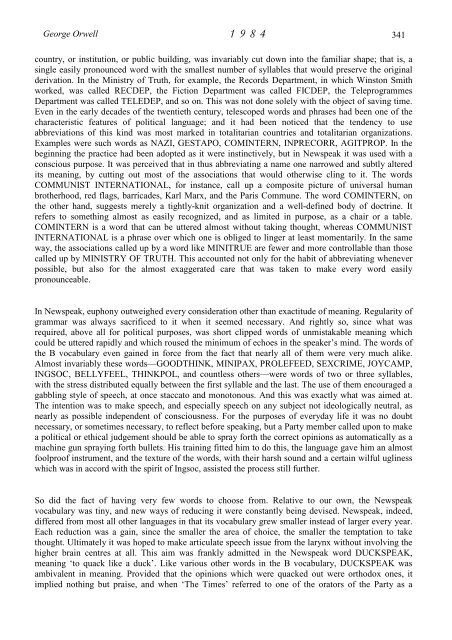You also want an ePaper? Increase the reach of your titles
YUMPU automatically turns print PDFs into web optimized ePapers that Google loves.
George Orwell 1 9 8 4<br />
country, or institution, or public building, was invariably cut down into the familiar shape; that is, a<br />
single easily pronounced word with the smallest number of syllables that would preserve the original<br />
derivation. In the Ministry of Truth, for example, the Records Department, in which Winston Smith<br />
worked, was called RECDEP, the Fiction Department was called FICDEP, the Teleprogrammes<br />
Department was called TELEDEP, and so on. This was not done solely with the object of saving time.<br />
Even in the early decades of the twentieth century, telescoped words and phrases had been one of the<br />
characteristic features of political language; and it had been noticed that the tendency to use<br />
abbreviations of this kind was most marked in totalitarian countries and totalitarian organizations.<br />
Examples were such words as NAZI, GESTAPO, COMINTERN, INPRECORR, AGITPROP. In the<br />
beginning the practice had been adopted as it were instinctively, but in Newspeak it was used with a<br />
conscious purpose. It was perceived that in thus abbreviating a name one narrowed and subtly altered<br />
its meaning, by cutting out most of the associations that would otherwise cling to it. The words<br />
COMMUNIST INTERNATIONAL, for instance, call up a composite picture of universal human<br />
brotherhood, red flags, barricades, Karl Marx, and the Paris Commune. The word COMINTERN, on<br />
the other hand, suggests merely a tightly-knit organization and a well-defined body of doctrine. It<br />
refers to something almost as easily recognized, and as limited in purpose, as a chair or a table.<br />
COMINTERN is a word that can be uttered almost without taking thought, whereas COMMUNIST<br />
INTERNATIONAL is a phrase over which one is obliged to linger at least momentarily. In the same<br />
way, the associations called up by a word like MINITRUE are fewer and more controllable than those<br />
called up by MINISTRY OF TRUTH. This accounted not only for the habit of abbreviating whenever<br />
possible, but also for the almost exaggerated care that was taken to make every word easily<br />
pronounceable.<br />
In Newspeak, euphony outweighed every consideration other than exactitude of meaning. Regularity of<br />
grammar was always sacrificed to it when it seemed necessary. And rightly so, since what was<br />
required, above all for political purposes, was short clipped words of unmistakable meaning which<br />
could be uttered rapidly and which roused the minimum of echoes in the speaker’s mind. The words of<br />
the B vocabulary even gained in force from the fact that nearly all of them were very much alike.<br />
Almost invariably these words—GOODTHINK, MINIPAX, PROLEFEED, SEXCRIME, JOYCAMP,<br />
INGSOC, BELLYFEEL, THINKPOL, and countless others—were words of two or three syllables,<br />
with the stress distributed equally between the first syllable and the last. The use of them encouraged a<br />
gabbling style of speech, at once staccato and monotonous. And this was exactly what was aimed at.<br />
The intention was to make speech, and especially speech on any subject not ideologically neutral, as<br />
nearly as possible independent of consciousness. For the purposes of everyday life it was no doubt<br />
necessary, or sometimes necessary, to reflect before speaking, but a Party member called upon to make<br />
a political or ethical judgement should be able to spray forth the correct opinions as automatically as a<br />
machine gun spraying forth bullets. His training fitted him to do this, the language gave him an almost<br />
foolproof instrument, and the texture of the words, with their harsh sound and a certain wilful ugliness<br />
which was in accord with the spirit of Ingsoc, assisted the process still further.<br />
So did the fact of having very few words to choose from. Relative to our own, the Newspeak<br />
vocabulary was tiny, and new ways of reducing it were constantly being devised. Newspeak, indeed,<br />
differed from most all other languages in that its vocabulary grew smaller instead of larger every year.<br />
Each reduction was a gain, since the smaller the area of choice, the smaller the temptation to take<br />
thought. Ultimately it was hoped to make articulate speech issue from the larynx without involving the<br />
higher brain centres at all. This aim was frankly admitted in the Newspeak word DUCKSPEAK,<br />
meaning ‘to quack like a duck’. Like various other words in the B vocabulary, DUCKSPEAK was<br />
ambivalent in meaning. Provided that the opinions which were quacked out were orthodox ones, it<br />
implied nothing but praise, and when ‘The Times’ referred to one of the orators of the Party as a<br />
341


